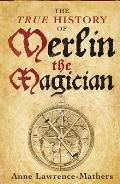Merlin Then and Now
A year ago, Yale University Press published Anne Lawrence-Mathers’s A True History of Merlin the Magician. It was a “densely written monograph,” according to Publishers Weekly, which explored the cultural manifestations of Merlin in late medieval Europe, starting with mentions in Geoffrey of Monmouth’s supposedly nonfiction history of Britain.
The Guardian’s Kathryn Hughes just decided to review the book, and her review focuses on the shocking revelation that Merlin was fictional: “It turns out that Merlin isn't real. He is, in fact, a big fat hoax, made up by a writer who had run out of things to say and was getting desperate.”
Hughes highlights how Geoffrey’s original presentation of a British prophet at “a time of great dynastic insecurity” was reassuring, and even told his local readers that “Britain had always played a special part in God's great plan. In the process, a small island stuck on the edge of the known world started to believe that it might just matter.”
Does that mean Britain’s special place is based on fraud? Hughes’s review seems to suggest Britain is really special in another way: as a cultural leader, creating in Merlin a shape-shifting trickster that becomes popular across Europe and across time.
But note the comments on the article, with Welsh readers insisting that Merlin was a real figure from Welsh myth and that non-Welsh authors have robbed the nation of its cultural heritage.
The Guardian’s Kathryn Hughes just decided to review the book, and her review focuses on the shocking revelation that Merlin was fictional: “It turns out that Merlin isn't real. He is, in fact, a big fat hoax, made up by a writer who had run out of things to say and was getting desperate.”
Hughes highlights how Geoffrey’s original presentation of a British prophet at “a time of great dynastic insecurity” was reassuring, and even told his local readers that “Britain had always played a special part in God's great plan. In the process, a small island stuck on the edge of the known world started to believe that it might just matter.”
Does that mean Britain’s special place is based on fraud? Hughes’s review seems to suggest Britain is really special in another way: as a cultural leader, creating in Merlin a shape-shifting trickster that becomes popular across Europe and across time.
But note the comments on the article, with Welsh readers insisting that Merlin was a real figure from Welsh myth and that non-Welsh authors have robbed the nation of its cultural heritage.



1 comment:
Thanks for alerting me to this book. One of my other fannish interests, in addition to Oz, is Arthur. One of the most interesting courses I took in college was a class on Arthurian Lit, and Geoffrey's "History" really does track salvation history in the Pentateuch quite closely, Merlin as prophet included.
Post a Comment